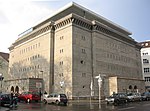The entirety of Germany was occupied and administered by the Allies of World War II from the Berlin Declaration on 5 June 1945 to the establishment of West Germany on 23 May 1949. Unlike occupied Japan, Germany was stripped of its sovereignty and former state: after Nazi Germany surrendered on 8 May 1945, four countries representing the Allies (the United States, United Kingdom, Soviet Union, and France) asserted joint authority and sovereignty through the Allied Control Council (ACC) under the Berlin Declaration of 5 June 1945 that led to the fall of the German Reich. At first, Allied-occupied Germany was defined as all territories of Germany before the 1938 Nazi annexation of Austria; the Potsdam Agreement on 2 August 1945 defined the new eastern German border by giving Poland and the Soviet Union all regions of Germany east of the Oder–Neisse line (eastern parts of Pomerania, Neumark, Posen-West Prussia, East-Prussia and almost Silesia) and divided the remaining "Germany as a whole" into four occupation zones, each administered by one of the Allies.All territories annexed by Germany before the war from Austria and Czechoslovakia were returned to these countries. The Memel Territory, annexed by Germany from Lithuania before the war, was annexed by the Soviet Union in 1945 and transferred to the Lithuanian SSR. All territories annexed by Germany during the war from Belgium, France, Italy, Luxembourg, Poland and Yugoslavia were returned to their respective countries.
Deviating from the occupation zones planned according to the London Protocol in 1944, at Potsdam, the United States, United Kingdom and the Soviet Union approved the detachment from Germany of the territories east of the Oder–Neisse line, with the exact line of the boundary to be determined in a final German peace treaty. This treaty was expected to confirm the shifting westward of Poland's borders, as the United Kingdom and United States committed themselves to support the permanent incorporation of eastern Germany into Poland and the Soviet Union. From March 1945 to July 1945, these former eastern territories of Germany had been administered under Soviet military occupation authorities, but following the Potsdam Agreement they were handed over to Soviet and Polish civilian administrations and ceased to constitute part of Allied-occupied Germany.
In the closing weeks of fighting in Europe, United States forces had pushed beyond the agreed boundaries for the future zones of occupation, in some places by as much as 320 km (200 miles). The so-called line of contact between Soviet and U.S. forces at the end of hostilities, mostly lying eastward of the July 1945-established inner German border, was temporary. After two months in which they had held areas that had been assigned to the Soviet zone, U.S. forces withdrew in the first days of July 1945. Some have concluded that this was a crucial move that persuaded the Soviet Union to allow American, British and French forces into their designated sectors in Berlin, which occurred at roughly the same time, although the need for intelligence gathering (Operation Paperclip) may also have been a factor. On 20 March 1948, the Soviets withdrew from the Allied Control Council; later leading to the establishment of the two German states in East and West both in 1949.










